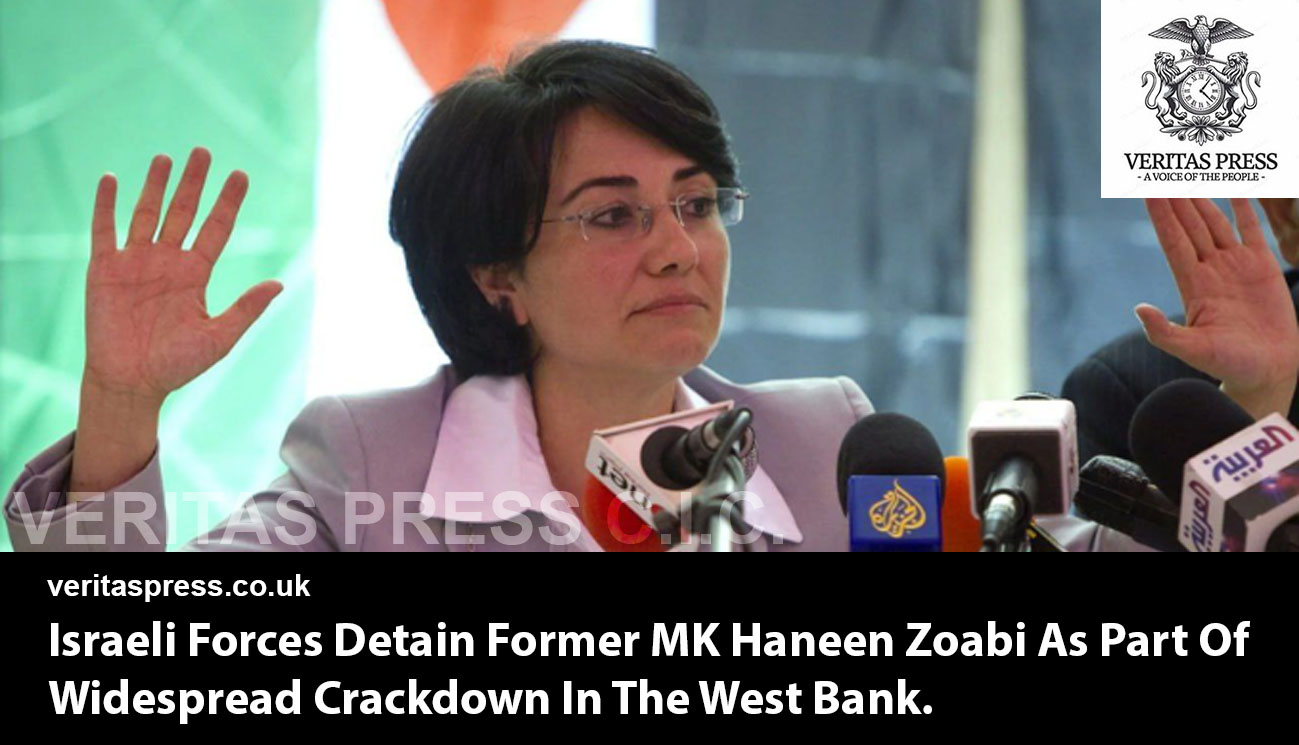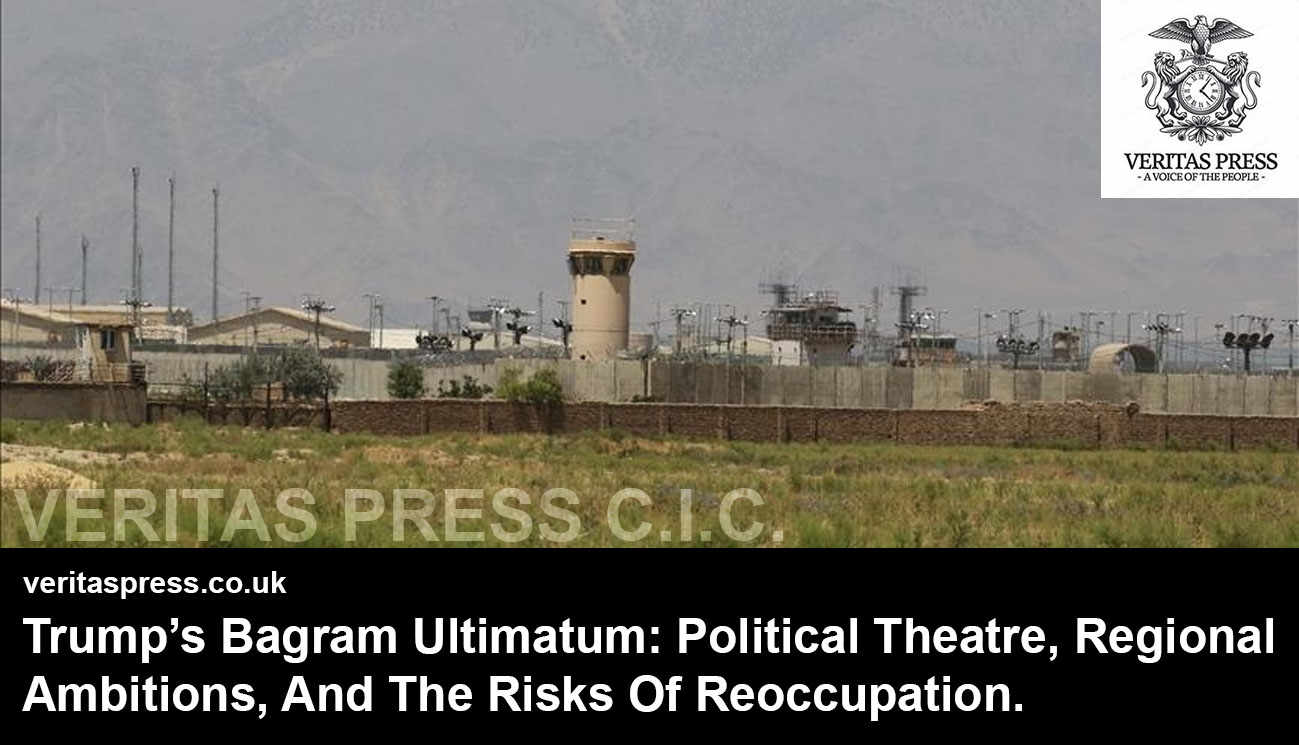At dawn on Sunday, September 21, 2025, Israeli forces conducted a sweeping arrest campaign across the occupied West Bank, detaining dozens of Palestinians. Among those arrested was Haneen Zoabi, a former Arab Member of Knesset (MK) from the Balad party, on allegations of “incitement to terrorism” related to statements she made abroad.
According to Zoabi’s attorneys and civil rights organisations, the arrest was carried out from her home in Nazareth in the early morning hours, and Zoabi was taken to the city of Tiberias for interrogation.
The Charges:
- The Israeli police confirm the detention followed multiple complaints over the remarks Zoabi made at an “anti-Israel conference abroad.”
- The police describe the alleged offences as public identification with a terrorist organisation and incitement to commit a terrorist act.
- Zoabi is said to have made statements at a conference in Vienna in October 2024, in which she reportedly equated Hamas with the Palestinian people, and stated that the attacks of 7 October were on their land, among other comments.
Reactions From Zoabi’s Legal Team And Civil Society:
- Attorney Hassan Jabareen, director of the Adalah Legal Centre, has criticised the arrest as legally disproportionate. He argued that Zoabi could have been summoned under normal legal procedures rather than arrested at her home at dawn by multiple officers.
- Political parties, including the Democratic Front and the Communist Party, denounced the arrest as part of a campaign to silence dissent among Arab citizens in Israel, alleging political policing and intimidation.
Context: Other Detentions & West Bank Tensions.
While Zoabi’s case is among the most prominent, rights groups and media reports indicate that many other Palestinians have been detained over recent days during intensified raids in cities and villages throughout the West Bank.
- Earlier in September, Israeli forces arrested over 100 Palestinians in Tulkarm and imposed curfews.
- There has been a pattern of raids targeting suspected militants, former prisoners, municipal figures, civilian homes, and villages near major Palestinian population centres. Some operations involve road blockages, sealing off areas, and restrictions on movement. (Note: some of these details are confirmed; others are reported by local outlets.)
Official Position & Statements:
- The Israel Police issued a statement saying that after receiving reports and consulting with relevant authorities, evidence was collected and examined, and it was determined that Zoabi’s statements raised suspicion of the named offences. Her detention followed “appropriate approvals.”
- Zoabi’s lawyers, however, raise concerns about the legal basis and timing of the operation, particularly given that it involved an early morning raid at her home. They are questioning whether due process is being followed and whether political motives are influencing law enforcement.
Broader Implications:
- Freedom of Speech & Minority Rights: Zoabi’s arrest has reignited debates within Israel and internationally about the limits of free speech, especially for Arab Israelis, and how statements made abroad are treated under Israeli security laws.
- Precedent for Political Expression: Observers warn that this case could set a precedent for how political speech, particularly criticism of state policy or alignment with Palestinian resistance, is criminalised.
- Erosion of Trust with Arab Communities: Civil society groups argue that arrests like this deepen a sense of marginalisation among Arab citizens, particularly when political figures are targeted in ways that appear selective or politically motivated.
Eyewitness & Media Reports:
- Local sources in Nazareth report that Zoabi’s home was raided in the early morning, and she was taken away by police without prior public notice.
- Media outlets note that Zoabi has been a polarising figure for years and has already been convicted in past cases (e.g. campaign-finance fraud/forgery, insulting a public servant), which critics say Israel is now using to support claims of criminal liability.
What We Don’t Yet Know:
- There is no full public disclosure yet from Israeli authorities of all the content of Zoabi’s speeches, alleged to be criminal, or whether they explicitly ordered or incited violence.
- It remains unclear whether her detention will be extended, or how the courts will interpret the balancing of national security concerns vs. freedom of political expression.
- Information is also still coming in about how many others exactly were arrested in the related raids, and whether they were formally charged.
Latest Related Developments:
- Israeli forces in recent operations have also conducted raids on the homes of activists and journalists. For example, Basel Adra, an Oscar-winning Palestinian filmmaker, reported that soldiers raided his home in the West Bank recently, searched his wife’s phone while their infant daughter was present, and blocked the entrances to his village.
- Human rights groups continue to document what they describe as patterns of collective punishment (curfews, movement restrictions, home demolitions, seizure of property) across Palestinian towns in the West Bank.
Analysis:
Analysts suggest that Zoabi’s arrest is part of a growing trend in which Israeli authorities are increasingly invoking laws on “incitement,” “support for terrorism,” or “public identification with terrorist organisations” to limit political dissent, especially among Arab Israelis and Palestinians in the occupied territories.
Some believe that the government’s hardline coalition (which includes elements of the far right) is pressuring security and legal institutions to take tougher action against figures seen as critical of Israeli policy. Others see these actions as feeding into heightened tensions following the war in Gaza and in the broader context of Israeli settler violence, demolitions, and intensified military operations in the West Bank.
Human rights and legal scholars warn that such tactics risk undermining the rule of law, eroding civil liberties, and increasing alienation among communities who already feel under occupation or second-class status.
Conclusion: Criminalising Dissent, Entrenching Occupation.
The detention of former MK Haneen Zoabi is not merely about one speech delivered abroad; it reflects a systematic policy of silencing Palestinian identity, dissent, and political agency. By storming her home at dawn and branding her words as “terrorism,” Israeli authorities underscored that resistance in any form, civic, political, or armed, is to be criminalised.
This comes against the backdrop of a sweeping crackdown across the West Bank. In Jenin, residents described bulldozers tearing up roads and sealing town entrances. “They closed us in with dirt mounds and interrogated our children in the street like criminals,” said Abu Ahmad, a father of three from Jaba. In Salfit, locals reported that Israeli forces not only arrested Mayor Ibrahim Assi but also seized municipal equipment. “They want to paralyse our town completely,” a council worker told Wafa. In Tarqumiya, near Hebron, settlers attempted to raid a Palestinian home and steal livestock; instead of arresting the settlers, soldiers detained the Palestinian homeowner. “We are punished for defending ourselves,” his wife told Al Jazeera.
Human rights groups argue that these are not isolated abuses but part of a deliberate pattern. Amnesty International called Zoabi’s detention “an alarming assault on freedom of expression,” while Human Rights Watch stressed that Israel’s reliance on vague incitement laws is a political tool to suppress Palestinian voices. The UN Office of the High Commissioner for Human Rights (OHCHR) warned as early as 2022 that Israel’s prosecutions of activists and journalists for “incitement” amounted to “judicial harassment.” A 2023 UN Human Rights Council report described the systematic targeting of Palestinian political participation as “structural repression embedded in the occupation.”
International actors are also sounding alarms. Members of the European Parliament’s Delegation for Relations with Palestine condemned Zoabi’s arrest as “an attempt to erase Palestinian political representation within Israel.” The International Federation for Human Rights (FIDH) denounced the mass raids across the West Bank as “collective punishment under the guise of counterterrorism.”
The symbolism of Zoabi’s arrest is profound. A woman who once served in the Knesset was dragged from her home in the same fashion as hundreds of ordinary Palestinians, students, mayors, farmers, and former prisoners. “If they can take a parliamentarian like this, what protection do we have?” asked Mahmoud Abdel Hadi’s brother, after Abdel Hadi was detained again in Nablus.
By blurring the line between security enforcement and political policing, Israel entrenches a system where all forms of Palestinian resistance and political expression are delegitimised. The UN High Commissioner for Human Rights has already warned that such measures form part of an apartheid structure under international law.
Zoabi’s case is therefore a bellwether. It shows how the machinery of occupation does not end at checkpoints and military incursions but extends into courtrooms, political parties, municipal offices, and even the realm of free speech itself. Behind the rhetoric of “incitement” lies the reality of repression: bulldozed streets in Jenin, confiscated equipment in Salfit, shackled students in Ramallah, and now the silencing of a former legislator. Together, these acts reflect not isolated security operations, but a coherent strategy to fragment Palestinian society, delegitimise its leaders, and suppress its voice.
Key UN / NGO Findings & Quotes:
- OHCHR – Escalating Violence, Unlawful Use of Force in Jenin and the West Bank
The UN human rights office has repeatedly expressed concern about the way Israeli security forces conduct operations in the West Bank, particularly in Jenin. In a statement from January 2025, spokesperson Thameen Al-Kheetan said:
“The deadly Israeli operations in recent days raise serious concerns about unnecessary or disproportionate use of force, including methods and means developed for war fighting, in violation of international human rights law norms and standards applicable to law enforcement operations.”
“This includes multiple airstrikes and apparently random shooting at unarmed residents attempting to flee or find safety.”
These quotes illustrate how OHCHR has flagged similar operations over recent months: raids, lethal force, displacement, and operations in civilian areas, often carried out in ways inconsistent with international law.
- OHCHR – Displacement & Use of Force Beyond Active Hostilities
On 17 February 2025, OHCHR released a statement noting that almost 40,000 Palestinians had been displaced in the northern West Bank amid intensifying military operations. In that same statement:
“Many of those killed were unarmed and posed no imminent threat … calling the killings ‘part of an expanding pattern of Israel’s unlawful use of force in the West Bank where there are no active hostilities.’”
This suggests that what is happening is not always framed (nor able to be justified) as combat operations, but rather as law enforcement or occupation-type activity where civilians are caught in the operations without adequate legal protections.
- OHCHR – Entrenched Impunity and Broader Violations
The UN’s High Commissioner for Human Rights, Volker Türk, has in several reports emphasised that:
“The entrenched impunity reported by our Office for decades cannot be permitted to continue. There must be accountability on all sides for violations seen over 56 years of occupation …”
Moreover, this includes concerns over “forced displacement, collective punishment, destruction of civilian property, incitement to hatred and violence” among other abuses.
- UN-NGO Concern Over Settler Violence, Unlawful Killings, & Suppression
The UN rights office has also condemned settler violence and how Israeli security forces sometimes operate in close proximity, or even in complicity, with settler groups, resulting in deaths, injuries, property losses, etc. For instance:
“In the West Bank, high levels of settler violence against Palestinians continue, causing death, injuries and loss of property and undermining Palestinian lives and livelihoods in many areas,” the UN rights office said in one statement.
These patterns amplify concerns that arrests (including for “incitement”) are part of a larger architecture of repression.
Advertisements
Tags:





























Leave a Reply